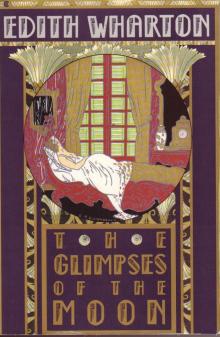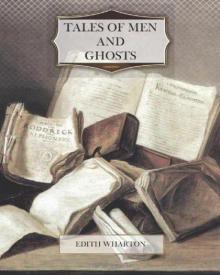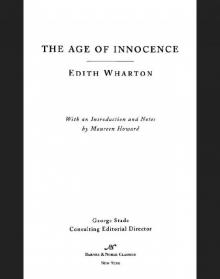- Home
- Edith Wharton
The Touchstone Page 8
The Touchstone Read online
Page 8
He tore the slip of paper in two and tossed the fragments across the desk to Glennard. Then he turned and walked out of the office.
Glennard dropped his head on his hands. If he had hoped to restore his self-respect by the simple expedient of assailing Flamel’s, the result had not justified his expectation. The blow he had struck had blunted the edge of his anger, and the unforeseen extent of the hurt inflicted did not alter the fact that his weapon had broken in his hands. He saw now that his rage against Flamel was only the last projection of a passionate self-disgust. This consciousness did not dull his dislike of the man; it simply made reprisals ineffectual. Flamel’s unwillingness to quarrel with him was the last stage of his abasement.
In the light of this final humiliation his assumption of his wife’s indifference struck him as hardly so fatuous as the sentimental resuscitation of his past. He had been living in a factitious world wherein his emotions were the sycophants of his vanity, and it was with instinctive relief that he felt its ruins crash about his head.
It was nearly dark when he left his office, and he walked slowly homeward in the complete mental abeyance that follows on such a crisis. He was not aware that he was thinking of his wife; yet when he reached his own door he found that, in the involuntary readjustment of his vision, she had once more become the central point of consciousness.
XIII
It had never before occurred to him that she might, after all, have missed the purport of the document he had put in her way. What if, in her hurried inspection of the papers, she had passed it over as related to the private business of some client? What, for instance, was to prevent her concluding that Glennard was the counsel of the unknown person who had sold the “Aubyn Letters.” The subject was one not likely to fix her attention—she was not a curious woman.
Glennard at this point laid down his fork and glanced at her between the candle-shades. The alternative explanation of her indifference was not slow in presenting itself. Her head had the same listening droop as when he had caught sight of her the day before in Flamel’s company; the attitude revived the vividness of his impression. It was simple enough, after all. She had ceased to care for him because she cared for someone else.
As he followed her upstairs he felt a sudden stirring of his dormant anger. His sentiments had lost all their factitious complexity. He had already acquitted her of any connivance in his baseness, and he felt only that he loved her and that she had escaped him. This was now, strangely enough, his dominating thought: the consciousness that he and she had passed through the fusion of love and had emerged from it as incommunicably apart as though the transmutation had never taken place. Every other passion, he mused, left some mark upon the nature; but love passed like the flight of a ship across the waters.
She sank into her usual seat near the lamp, and he leaned against the chimney, moving about with an inattentive hand the knick-knacks on the mantel.
Suddenly he caught sight of her reflection in the mirror. She was looking at him. He turned and their eyes met.
He moved across the room and stood before her.
“There’s something that I want to say to you,” he began in a low tone.
She held his gaze, but her color deepened. He noticed again, with a jealous pang, how her beauty had gained in warmth and meaning. It was as though a transparent cup had been filled with wine. He looked at her ironically.
“I’ve never prevented your seeing your friends here,” he broke out. “Why do you meet Flamel in out-of-the-way places? Nothing makes a woman so cheap—”
She rose abruptly and they faced each other a few feet apart.
“What do you mean?” she asked.
“I saw you with him last Sunday on the Riverside Drive,” he went on, the utterance of the charge reviving his anger.
“Ah,” she murmured. She sank into her chair again and began to play with a paper-knife that lay on the table at her elbow.
Her silence exasperated him.
“Well?” he burst out. “Is that all you have to say?”
“Do you wish me to explain?” she asked, proudly.
“Do you imply I haven’t the right to?”
“I imply nothing. I will tell you whatever you wish to know. I went for a walk with Mr. Flamel because he asked me to.”
“I didn’t suppose you went uninvited. But there are certain things a sensible woman doesn’t do. She doesn’t slink about in out-of-the-way streets with men. Why couldn’t you have seen him here?”
She hesitated. “Because he wanted to see me alone.”
“Did he, indeed? And may I ask if you gratify all his wishes with equal alacrity?”
“I don’t know that he has any others where I am concerned.” She paused again and then continued, in a lower voice that somehow had an under-note of warning. “He wished to bid me good-by. He’s going away.”
Glennard turned on her a startled glance. “Going away?”
“He’s going to Europe to-morrow. He goes for a long time. I supposed you knew.”
The last phrase revived his irritation. “You forget that I depend on you for my information about Flamel. He’s your friend and not mine. In fact, I’ve sometimes wondered at your going out of your way to be so civil to him when you must see plainly enough that I don’t like him.”
Her answer to this was not immediate. She seemed to be choosing her words with care, not so much for her own sake as for his, and his exasperation was increased by the suspicion that she was trying to spare him.
“He was your friend before he was mine. I never knew him till I was married. It was you who brought him to the house and who seemed to wish me to like him.”
Glennard gave a short laugh. The defence was feebler than he had expected: she was certainly not a clever woman.
“Your deference to my wishes is really beautiful; but it’s not the first time in history that a man has made a mistake in introducing his friends to his wife. You must, at any rate, have seen since then that my enthusiasm had cooled; but so, perhaps, has your eagerness to oblige me.”
She met this with a silence that seemed to rob the taunt of half its efficacy.
“Is that what you imply?” he pressed her.
“No,” she answered with sudden directness. “I noticed some time ago that you seemed to dislike him, but since then—”
“Well—since then?”
“I’ve imagined that you had reasons for still wishing me to be civil to him, as you call it.”
“Ah,” said Glennard, with an effort at lightness; but his irony dropped, for something in her voice made him feel that he and she stood at last in that naked desert of apprehension where meaning skulks vainly behind speech.
“And why did you imagine this?” The blood mounted to his forehead. “Because he told you that I was under obligations to him?”
She turned pale. “Under obligations?”
“Oh, don’t let’s beat about the bush. Didn’t he tell you it was I who published Mrs. Aubyn’s letters? Answer me that.”
“No,” she said; and after a moment which seemed given to the weighing of alternatives, she added: “No one told me.”
“You didn’t know then?”
She seemed to speak with an effort. “Not until—not until—”
“Till I gave you those papers to sort?”
Her head sank.
“You understood then?”
“Yes.”
He looked at her immovable face. “Had you suspected—before?” was slowly wrung from him.
“At times—yes—” Her voice dropped to a whisper.
“Why? From anything that was said—?”
There was a shade of pity in her glance. “No one said anything—no one told me anything.” She looked away from him. “It was your manner—”
“My manner?”
“Whenever the book was mentioned. Things you said—once or twice—your irritation—I can’t explain—”
Glennard, unconsciously, had moved nearer. He
breathed like a man who has been running. “You knew, then, you knew”—he stammered. The avowal of her love for Flamel would have hurt him less, would have rendered her less remote. “You knew—you knew—” he repeated; and suddenly his anguish gathered voice. “My God!” he cried, “you suspected it first, you say—and then you knew it—this damnable, this accursed thing; you knew it months ago—it’s months since I put that paper in your way—and yet you’ve done nothing, you’ve said nothing, you’ve made no sign, you’ve lived alongside of me as if it had made no difference—no difference in either of our lives. What are you made of, I wonder? Don’t you see the hideous ignominy of it? Don’t you see how you’ve shared in my disgrace? Or haven’t you any sense of shame?”
He preserved sufficient lucidity, as the words poured from him, to see how fatally they invited her derision; but something told him they had both passed beyond the phase of obvious retaliations, and that if any chord in her responded it would not be that of scorn.
He was right. She rose slowly and moved toward him.
“Haven’t you had enough—without that?” she said, in a strange voice of pity.
He stared at her. “Enough—?”
“Of misery….”
An iron band seemed loosened from his temples. “You saw then…?” he whispered.
“Oh, God–-oh, God–-” she sobbed. She dropped beside him and hid her anguish against his knees. They clung thus in silence, a long time, driven together down the same fierce blast of shame.
When at length she lifted her face he averted his. Her scorn would have hurt him less than the tears on his hands.
She spoke languidly, like a child emerging from a passion of weeping. “It was for the money—?”
His lips shaped an assent.
“That was the inheritance—that we married on?”
“Yes.”
She drew back and rose to her feet. He sat watching her as she wandered away from him.
“You hate me,” broke from him.
She made no answer.
“Say you hate me!” he persisted.
“That would have been so simple,” she answered with a strange smile. She dropped into a chair near the writing-table and rested a bowed forehead on her hand.
“Was it much—?” she began at length.
“Much—?” he returned, vaguely.
“The money.”
“The money?” That part of it seemed to count so little that for a moment he did not follow her thought.
“It must be paid back,” she insisted. “Can you do it?”
“Oh, yes,” he returned, listlessly. “I can do it.”
“I would make any sacrifice for that!” she urged.
He nodded. “Of course.” He sat staring at her in dry-eyed self-contempt. “Do you count on its making much difference?”
“Much difference?”
“In the way I feel—or you feel about me?”
She shook her head.
“It’s the least part of it,” he groaned.
“It’s the only part we can repair.”
“Good heavens! If there were any reparation—” He rose quickly and crossed the space that divided them. “Why did you never speak?” he asked.
“Haven’t you answered that yourself?”
“Answered it?”
“Just now—when you told me you did it for me.” She paused a moment and then went on with a deepening note—“I would have spoken if I could have helped you.”
“But you must have despised me.”
“I’ve told you that would have been simpler.”
“But how could you go on like this—hating the money?”
“I knew you would speak in time. I wanted you, first, to hate it as I did.”
He gazed at her with a kind of awe. “You’re wonderful,” he murmured. “But you don’t yet know the depths I’ve reached.”
She raised an entreating hand. “I don’t want to!”
“You’re afraid, then, that you’ll hate me?”
“No—but that you’ll hate ME. Let me understand without your telling me.”
“You can’t. It’s too base. I thought you didn’t care because you loved Flamel.”
She blushed deeply. “Don’t—don’t—” she warned him.
“I haven’t the right to, you mean?”
“I mean that you’ll be sorry.”
He stood imploringly before her. “I want to say something worse—something more outrageous. If you don’t understand THIS you’ll be perfectly justified in ordering me out of the house.”
She answered him with a glance of divination. “I shall understand—but you’ll be sorry.”
“I must take my chance of that.” He moved away and tossed the books about the table. Then he swung round and faced her. “Does Flamel care for you?” he asked.
Her flush deepened, but she still looked at him without anger. “What would be the use?” she said with a note of sadness.
“Ah, I didn’t ask THAT,” he penitently murmured.
“Well, then—”
To this adjuration he made no response beyond that of gazing at her with an eye which seemed now to view her as a mere factor in an immense redistribution of meanings.
“I insulted Flamel to-day. I let him see that I suspected him of having told you. I hated him because he knew about the letters.”
He caught the spreading horror of her eyes, and for an instant he had to grapple with the new temptation they lit up. Then he said, with an effort—“Don’t blame him—he’s impeccable. He helped me to get them published; but I lied to him too; I pretended they were written to another man… a man who was dead….”
She raised her arms in a gesture that seemed to ward off his blows.
“You DO despise me!” he insisted.
“Ah, that poor woman—that poor woman—” he heard her murmur.
“I spare no one, you see!” he triumphed over her. She kept her face hidden.
“You do hate me, you do despise me!” he strangely exulted.
“Be silent!” she commanded him; but he seemed no longer conscious of any check on his gathering purpose.
“He cared for you—he cared for you,” he repeated, “and he never told you of the letters—”
She sprang to her feet. “How can you?” she flamed. “How dare you? THAT—!”
Glennard was ashy pale. “It’s a weapon… like another….”
“A scoundrel’s!”
He smiled wretchedly. “I should have used it in his place.”
“Stephen! Stephen!” she cried, as though to drown the blasphemy on his lips. She swept to him with a rescuing gesture. “Don’t say such things. I forbid you! It degrades us both.”
He put her back with trembling hands. “Nothing that I say of myself can degrade you. We’re on different levels.”
“I’m on yours, whatever it is!”
He lifted his head and their gaze flowed together.
XIV
The great renewals take effect as imperceptibly as the first workings of spring. Glennard, though he felt himself brought nearer to his wife, was still, as it were, hardly within speaking distance. He was but laboriously acquiring the rudiments of their new medium of communication; and he had to grope for her through the dense fog of his humiliation, the distorting vapor against which his personality loomed grotesque and mean.
Only the fact that we are unaware how well our nearest know us enables us to live with them. Love is the most impregnable refuge of self-esteem, and we hate the eye that reaches to our nakedness. If Glennard did not hate his wife it was slowly, sufferingly, that there was born in him that profounder passion which made his earlier feeling seem a mere commotion of the blood. He was like a child coming back to the sense of an enveloping presence: her nearness was a breast on which he leaned.
They did not, at first, talk much together, and each beat a devious track about the outskirts of the subject that lay between them like a haunted wood. But every word,
every action, seemed to glance at it, to draw toward it, as though a fount of healing sprang in its poisoned shade. If only they might cut away through the thicket to that restoring spring!
Glennard, watching his wife with the intentness of a wanderer to whom no natural sign is negligible, saw that she had taken temporary refuge in the purpose of renouncing the money. If both, theoretically, owned the inefficacy of such amends, the woman’s instinctive subjectiveness made her find relief in this crude form of penance. Glennard saw that she meant to live as frugally as possible till what she deemed their debt was discharged; and he prayed she might not discover how far-reaching, in its merely material sense, was the obligation she thus hoped to acquit. Her mind was fixed on the sum originally paid for the letters, and this he knew he could lay aside in a year or two. He was touched, meanwhile, by the spirit that made her discard the petty luxuries which she regarded as the signs of their bondage. Their shared renunciations drew her nearer to him, helped, in their evidence of her helplessness, to restore the full protecting stature of his love. And still they did not speak.
It was several weeks later that, one afternoon by the drawing-room fire, she handed him a letter that she had been reading when he entered.
“I’ve heard from Mr. Flamel,” she said.
Glennard turned pale. It was as though a latent presence had suddenly become visible to both. He took the letter mechanically.
“It’s from Smyrna,” she said. “Won’t you read it?”
He handed it back. “You can tell me about it—his hand’s so illegible.” He wandered to the other end of the room and then turned and stood before her. “I’ve been thinking of writing to Flamel,” he said.
She looked up.
“There’s one point,” he continued, slowly, “that I ought to clear up. I told him you’d known about the letters all along; for a long time, at least; and I saw it hurt him horribly. It was just what I meant to do, of course; but I can’t leave him to that false impression; I must write him.”
She received this without outward movement, but he saw that the depths were stirred. At length she returned, in a hesitating tone, “Why do you call it a false impression? I did know.”

 The Age of Innocence
The Age of Innocence The Reef
The Reef Summer
Summer The Glimpses of the Moon
The Glimpses of the Moon Xingu
Xingu The Fruit of the Tree
The Fruit of the Tree Fast and Loose
Fast and Loose Artemis to Actaeon and Other Verse
Artemis to Actaeon and Other Verse The Line of Least Resistance
The Line of Least Resistance The Lamp of Psyche
The Lamp of Psyche The Reckoning
The Reckoning Afterward
Afterward The New York Stories of Edith Wharton
The New York Stories of Edith Wharton The 2014 Halloween Horrors Megapack
The 2014 Halloween Horrors Megapack 'Copy': A Dialogue
'Copy': A Dialogue The Recovery
The Recovery The Fulness of Life
The Fulness of Life Early Short Stories Vol. 1
Early Short Stories Vol. 1 Tales of Men and Ghosts
Tales of Men and Ghosts The House of the Dead Hand
The House of the Dead Hand That Good May Come
That Good May Come The Buccaneers
The Buccaneers Other Times, Other Manners
Other Times, Other Manners The Hermit and the Wild Woman
The Hermit and the Wild Woman Kerfol
Kerfol The Duchess at Prayer
The Duchess at Prayer Bunner Sisters
Bunner Sisters The Choice
The Choice Madame De Treymes
Madame De Treymes Ethan Frome, Summer, Bunner Sisters
Ethan Frome, Summer, Bunner Sisters In Morocco
In Morocco The Valley of Decision
The Valley of Decision Age of Innocence (Barnes & Noble Classics Series)
Age of Innocence (Barnes & Noble Classics Series) The Angel at the Grave
The Angel at the Grave April Showers
April Showers Sanctuary
Sanctuary The Bunner Sisters
The Bunner Sisters Mrs. Manstey's View
Mrs. Manstey's View Writing a War Story
Writing a War Story The Custom of the Country
The Custom of the Country In Trust
In Trust The Triumph of the Night
The Triumph of the Night The Hermit and the Wild Woman, and Other Stories
The Hermit and the Wild Woman, and Other Stories Roman Fever and Other Stories
Roman Fever and Other Stories The Mission of Jane
The Mission of Jane The Descent of Man and Other Stories
The Descent of Man and Other Stories Coming Home
Coming Home The Touchstone
The Touchstone Early Short Stories Vol. 2
Early Short Stories Vol. 2 Edith Wharton's Verse, 1879-1919, from various journals.
Edith Wharton's Verse, 1879-1919, from various journals.